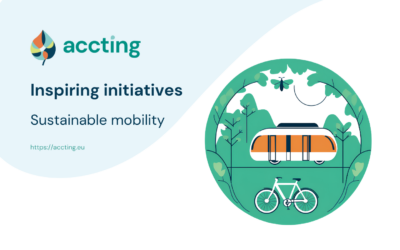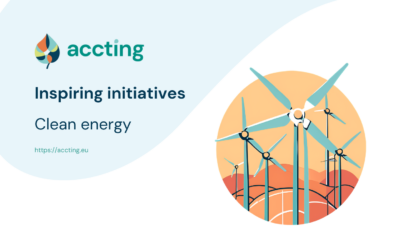The agenda for future research developed by ACCTING aims to pave the way for effective policymaking and implementation by serving as a crucial reference document that encapsulates the research gaps identified in Green Deal policy areas: climate action, clean energy, sustainable mobility, farm to fork, and biodiversity.
The research agenda presents research gaps identified within the framework of Green Deal policies. Its primary objective is to provide a roadmap for policymakers, researchers, and stakeholders to identify key knowledge gaps and address critical research questions.
Following ACCTING’s research lines the document identifies knowledge gaps and suggests research questions in the following policy areas of the Green Deal: climate action, clean energy, sustainable mobility, farm to fork, and biodiversity. In each area, ACCTING suggests targeted research efforts to unravel complexities, quantify impacts, and develop innovative solutions.
The ACCTING project’s findings highlight the challenges faced by socially vulnerable and marginalized individuals in achieving behaviour change aligned with the goals of the Green Deal. Results from the first research cycle reveal that enabling and hindering factors for behaviour change are interrelated and context dependent. Across research lines and policy sectors, transversal themes are highlighted:
Intersectional data and analysis
The intersection of multiple inequalities positions people differently in terms of behaviour change. But there is a need for data and methods that fully capture how multiple inequalities intersect and affect people’s ability to make behavioural changes to achieve the EU Green Deal goals.
The role of authorities and legislation
The intricate interactions between governance, policy implementation, and activism, is the focal point of attention in this research agenda. The aim is to investigate the dynamics of these relationships, focusing specifically on situations where policy decisions disproportionately affect vulnerable communities.
Lack of trust in authorities and streamlined policymaking are preventing entrepreneurs and individuals from making decisions with a long-term sustainability view. Accordingly, research is needed on trust and the role of streamlined legislation among the marginalised and vulnerable.
The impact of norms and personal values
The empirical findings illuminate the multifaceted role and implications of value systems within both urban and rural contexts, particularly highlighting their pivotal impact on individual and group behaviour toward nature and sustainability.
Results suggest that men tend to make different choices than women. However, we need to address this role of men and masculinities, as there is a lack of knowledge about how masculinities work as enablers or hinders of sustainability, and how they are/can be transformed.
Intergenerational and cross-cultural dialogue
There seems to be great potential of exchange across cultural backgrounds and generations to contribute to the advance of sustainable values and practices, yet it continues to be an underexplored area.
It is essential to understand the role of community-led initiatives in facilitating cross-cultural knowledge exchange. Exploring how these initiatives can bridge cultural divides, promote social cohesion, and empower vulnerable communities to collectively address sustainability challenges could make a significant contribution to the discussion on planning policies for sustainable communities.
The research highlights the pivotal role of trust and a sense of community belonging in motivating citizens to actively engage in energy decision-making processes. By underlining these critical knowledge gaps, ACCTING aims to contribute to the ongoing transformation towards a sustainable, low-carbon, and inclusive future.


